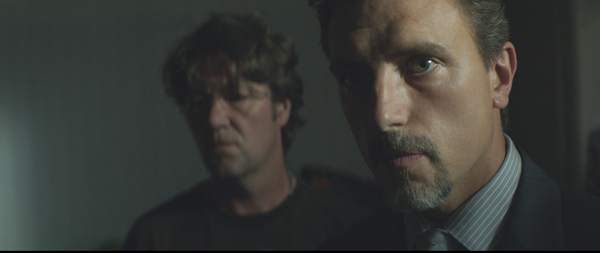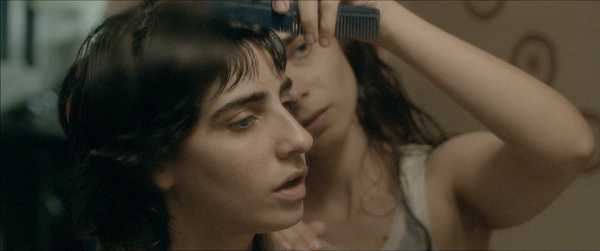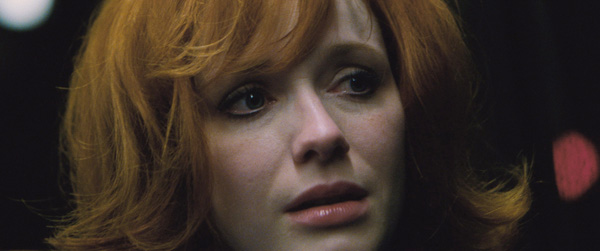One of the top films at Cannes this year—and one of the most shocking and brutal—was The Tribe, from the Ukraine. It was also the most ambitious, dangerous, and accomplished by a debut filmmaker. No subtitles were necessary. It has no spoken dialogue and no translation of any kind; it’s all told through sign language. The notoriety that it attained during the festival is not hyperbole. “Dickensian” doesn’t quite cover it; it’s not for the faint of heart.
The film begins unassumingly with a boy about 16 or 17 years old asking directions for a boarding school for the deaf, presumably run by the state. (We only know his name, Sergey, from the final credits.) When he arrives, it’s the first day of school and everyone is well behaved in the front of the administration, but when Sergey (Grigory Fesenko) enters his first class, his hell begins.
At first, it’s like any other classroom, with its cliques and the body language equivalent of students snickering. The immersed viewer is forced to pay extra attention throughout to the nuances of expressions and interactions, learning the ropes moment by moment and searching for clues for the pecking order—at the bottom is the boy with Down syndrome. Like Sergey, everyone is on their own here (adult supervision disappears after the first minutes).
Five students run the boys’ dormitory, demanding protection money, determining who sleeps where, and controlling a low-rung crime ring, which includes pimping out two female classmates. The film might raise eyebrows in how it portrays the prostitutes (though that’s merely the tip of the iceberg). Unlike many movies dealing with sex trafficking, The Tribe depicts the young females as assertive and willing participants. No tears or pleas of help from them. Tricking is all for cause: to pay for passports and head to Italy.
After proving himself at a bare-knuckle fight (four against one), Sergey becomes the new flunky. He follows orders and moves up the ranks, soon becoming the new pimp on the block. Sergey negotiates a price for the girls with truckers, and there his trouble really begins. From his earnings, he offers money for the one-on-one services of Anya (Yana Novikova, who bears a resemblance to Kirsten Dunst).
At first, Sergey just wants to caress and admire her, but she’s all business and won’t allow him to kiss her. Though Anya only gives him the time of day if he has money, Sergey sees her as his girlfriend. His affection begins to interfere with the truck stop trade when he won’t allow her to trick with another john, and the other guys gang up on him, demoting Sergey to begging on a train. (In a token of love, he gives Anya all the cash that he has stolen on a train.) The more he bends the rules, the more the powerful pack squashes him.
The Tribe has the hallmarks of international art-house cinema: the long tracking shots, handheld camera, non-professional actors, onsite graffiti scarred locations, and explicit sex. (According to director Myroslav Slaboshpytskiy, “All of our artists are children of the street” and deaf mutes.) Besides the intimacy of the sex scenes, the sense of realism and the young age of the actors reenacting Kama Sutra will give the audience pause; viewers are turned into voyeurs. (What has Blue Is the Warmest Color wrought?) And that’s not to downplay the violence. For some, the grimness of Slaboshpytskiy’s harsh microcosm will be too much, causing many to cover their eyes.
Though The Tribe was by far the most hard-hitting and vivid work in the festival, it was passed over for the best first film award, the Camera d’Or, an important distinction that lands a filmmaker on the map. It has been given since 1978 “to recognize the achievements of young filmmakers” (from the Critics Week catalogue). Previous recipients include Mira Nair’s Salaam Bombay!, Steve McQueen’s Hunger, and Benh Zeitlin’s Beasts of the Southern Wild. However, The Tribe did win the Grand Prize in the Critics Week selection (with a 4,000 euros cash prize).
The Camera d’Or went to the proficient and too straightforward Party Girl, made by three French directors (Marie Amachoukeli, Claire Burger, and Samuel Theis), all self-described longtime friends. Given the number of cooks, the tone still manages to be consistent: yet another handheld, close-up heavy examination of a working-class life (the influence of the Dardenne brothers could be seen everywhere in Cannes).
“Wherever you dance is home,” could be the motto of Angelique, who has worked the block of Strasbourg’s cabarets. She’s the oldest in a clique of erotic dancers (don’t call them strippers—they keep their skimpy outfits on), hovering somewhere in her early sixties.
One of her customers, Michel (Joseph Bour), asks Angelique out on a bona fide date because he doesn’t want to have to pay to see her. He’s a retired miner ready to settle down. They have only known each other from their interactions at Le Tank, her workplace, so it’s understandable that she tells him to knock it off when he suddenly and awkwardly pops out a marriage proposal. He reasons that “Time isn’t on our side,” and she says yes unreservedly at that moment.
One sign that the relationship is off to a bumpy start: they never have sex. Second, Angelique would rather spend time with her mates at the club. A quiet night at home has little appeal, and it becomes apparent she’s telling the truth when she says that nobody has told her what to do before now. With her impaired sense of self-perception, she’s almost like a Tennessee Williams character, but without the poetry.
On one level, Party Girl speaks to anyone who is reluctant to change, to realize circumstances alter as one grows older but not necessarily wiser. Most dancers, erotic or otherwise, have a short shelf life, and this line of work is not noted for its diversity of looks or its longevity. So the premise seems forced, as Angelique does so little at her job. No longer lithe, she dyes her hair, maintaining an out-of-date teased hairdo popular decades ago. She isn’t seen dancing, enticing a customer to buy expensive bottle service, or engaging in a “private show.” She just guzzles booze at the bar—alone.
The story behind the film upstages Party Girl. Angelique is played by co-director Samuel Theis’s mother, Angelique Litzenburger, an actual bar hostess who married later in life, and Theis plays her son Sam. Her other children play their onscreen counterparts, further blending real life with fiction. Perhaps as a result, it’s one of best improvised-based films in recent memory, though audiences will know exactly which direction Angelique, and the film, will stagger toward.
Too often, new directors bit off more than they could chew. July Jung’s sensitive A Girl at My Door, produced by Cannes favorite Lee Chang-dong (director of Secret Sunshine), was the second Korean police drama here (after the exuberantly nonsensical A Hard Day). Character driven and just-the-facts-ma’am serious, it touches upon alcoholism, domestic abuse, pedophilia, homophobia, and xenophobia in a fishing backwater, often making its themes too explicitly clear and with very little ambiguity.
Over-stuffing didn’t just occur with tyro filmmakers. In the Greek drama Xenia by Panos Koutras (his fourth film), precocious Miley Cyrus–wannabe Dany is a 16-year-old homeless gay hustler recently left motherless searching for the father he has never known. Armed with a gun, the half-Albanian (who lacks the proper documentation to remain in Greece) tries not to get deported, fights right-wing fascists, and coaches his older, hunky brother for a Pop Idol TV contest. He’s also a drama queen. By the second hour, I was exhausted.
Another crime-based film, this time from India, does it right: Kanu Behl’s Titli, which effortlessly blends noirish intrigue with on-location, you-are-there squalor. The director doesn’t pile too much on his plate, and especially for a first-timer, he draws out convincing performances from his cast, most of whom are making their debut. The script also offers two strong female roles.
In his early twenties, Titli (the appealing Shashank Arora) wants to escape his family of small-time hoods. Living in the same crammed quarters, they specialize in car-jacking: smashing windshields, beating and robbing the passengers. He needs 300,000 rupees to start up his own legit business, but his bulling, uncouth older brother, the film’s heavy, has other plans to keep his noticeably restless younger brother at home: to marry him off to a girl with a dowry, a woman who can be used as a decoy for their schemes.
Pressured, Titli marries the girl. On one hand, he should be so lucky. She comes from a very middle-class family, and she’s very pretty—but something’s up. This is one marriage that will not be consummated; his bride has her own agenda. The suspense builds as one of Titli’s escape plans falls apart, replaced by another flawed scheme that is just as wobbly. At more than two hours, the film runs a little long, but it would be difficult to choose what to trim; each scene has telling details that push the story forward.
In contrast, another debut, Snow in Paradise, takes a more obtuse approach. It’s also set in a crime subculture, but this time in the East London of rising real estate prices, where Cockneys are now an outnumbered demo in former slums now considered chic. But editor (Control)-turned-director Andrew Hulme excessively lays down the code of thieves—actually they’re drug dealers. We are told over and over again what is “proper,” and the plot doesn’t depart enough from other low-budget British indies.
Snow in Paradise is part of a trend here—a movie with a compelling backstory. It was co-written by East Ender Martin Askew, who converted to Islam and who also plays the coldly paternal Uncle Jimmy. Maybe because he lived the life, Askew brings authority to the film, as well as a dangerously seductive charm.
With the buffed bod of a top MMA athlete but with no apparent jobs skills, Dave (Frederick Schmidt) joins his Uncle Jimmy’s crime ring. Dave is off to a rocky start—he brings along his best friend, wannabe (and terrible) rapper Tariq (Aymen Hamdouchi) on a transaction, though his friend wants nothing to do with the business. Tariq’s non-white presence raises suspicions among the clan, and he eventually goes missing.
Dave has another problem: he siphons cocaine that he’s supposed to deliver, snorting or sharing it with his mates or his on-again-off-again girlfriend/prostitute. His judgment is so impaired that he believes he can get away with two-timing his uncle, yet he wonders why Tariq has disappeared. His search takes him to the mosque where Tariq regularly worshiped and where Dave begins to find solace.
Much of the exposition is so redundant that a viewer might think it’s accidental that the film subtly implies that a xenophobic, white Londoner would find direction and peace in Islam, though it ends somewhat ambiguously on the point of whether Islam is a refuge or a calling for Dave or both. Everything else is by the numbers: class and ethnic conflict, warring factions, and a lone wolf bucking the system. (Jimmy compliments his strapping nephew, dressed in a stylish, form-fitting outfit, by saying, “You could bury someone in a suit like that,” but the dialogue isn’t usually that sinister or snappy.) The eclectic soundtrack gives it a kick in the pants, and at times slips into a John Berry–esque jazz score.
A complex first film that carefully trods a tightrope, Next to Her is one of several strong showings from Israel. It’s always a dicey move to cast a noted actor as someone mentally disabled. Is the performance in good taste? Is it based largely on tics and mannerisms? First off, the story here is absorbing and serves as a showcases the entire cast. Second, if you weren’t familiar with the career of prolific actress Dana Ivgy (recently in the Tribeca award–winning Zero Motivation, among many good films), you probably would believe that the role of 23-year-old Gaby was played by someone with a mental disability. It’s a mesmerizing performance.
Next to Her has as much of a personal backstage story as the family affair of Party Girl. Director Asaf Korman co-wrote the script with Livon Ben Shlush, his wife and lead actress, basing it on Shlush’s real-life relationship with her sister. She plays Chelli, who works as a security guard at a school by day, coming home to care for Gaby (Ivgy) by herself, with no life of her own in between. On a typical day, she returns to the claustrophobic one-bedroom apartment and is greeted to the thumping noise of Gaby hitting her head on the floor repeatedly, with the complaining neighbors next door banging on the wall. The twentysomething has been leaving Gaby completely alone when she’s at work, and only takes her younger sister to a daycare facility after a social worker orders her to do so.
When a physical education teacher at work pays her some attention, Chelli jumps at the chance to go to a party with him, even if she has to wait outside a disco when her name isn’t on the guest list. The film becomes a delicate variation of speed dating once Chelli seriously starts seeing Zohar, who becomes a fixture in her disheveled dwelling (he stills lives with his mom, so they have to go to her place).
Zohar (Yaakov Daniel Zada) makes the right moves in terms of getting along with fifth wheel Gaby. He indulges her on an outing to an amusement park and, embarrassed, looks away when Gaby wanders around the flat nude. His negotiation between pleasing Chelli and befriending Gaby is complicated and convincing, though rocky. He and Chelli have different approaches to supervising the sister. Zohar doesn’t reprimand Gaby when she masturbates; Chelli tries to stop her. But there’s an indication that this relationship isn’t going to work: Chelli slaps a disobedient Gaby to get her into Zohar’s car; her boyfriend visibly disapproves.
It’s not every film that displays such an immediate sense of intimacy between two adult sisters, besides offering such an unfiltered, matter-of-fact depiction of everyday living (the messy apartment) or the stress and the strain of caring for someone in need of constant supervision.
By far, the directorial debut with the highest profile anywhere at Cannes was Ryan Gosling’s Lost River. This is the second year in a row that a film that he’s been attached to has taken a critical drubbing. Last year, Only God Forgives came out bruised. His dreamy and dystopian film, by way of Detroit, isn’t as bad as the tweets would have you believe, though it’s not quite successful, either. Striving for the nightmarish surreal, combined with working-class social realism, it comes across as affected and bizarre.
It could have been filmed in Flint, Michigan, or any neighborhood of abandoned or foreclosed homes, with characters named Rat (Saoirse Roman), who has a pet rodent; Cat (Eva Mendes); and teenager Bones, played by Gosling lookalike Iain De Caestecker, presumably a stand-in for the director. In one slender plot line, Bones’s single mother Billy (Christina Hendricks) tries to save her family from being kicked out of the streets, but whatever she’ll do, she won’t put out for cash.
The focus is not in the strung-together vignettes but rather the macabre and grim atmosphere. Gosling has made a movie that would be ripe for a midnight movie screening, circa 1977. It’s fitting that in the credits he thanks Guillermo del Toro, though perhaps he really should offer gratitude to David Lynch.










Leave A Comment